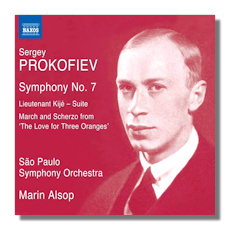
The Internet's Premier Classical Music Source
Related Links
- Prokofieff Reviews
- Latest Reviews
- More Reviews
-
By Composer
-
Collections
DVD & Blu-ray
Books
Concert Reviews
Articles/Interviews
Software
Audio
Search Amazon
Recommended Links
Site News
 CD Review
CD Review
Serge Prokofieff

- Symphony #7 in C Sharp minor, Op. 131:
- Suite "The Love for Three Oranges", Op. 33bis (Excerpts)::
- March
- Scherzo
- Suite "Lieutenant Kijé", Op. 60
São Paulo Symphony Orchestra/Marin Alsop
Naxos 8.573620 55:42
Also available on SACD:
This is Marin Alsop's final entry in her cycle of the complete Prokofiev symphonies on the Naxos label. She has done all of them with the São Paulo Symphony Orchestra, of which she serves as Music Director. She also holds that same post with the Baltimore Symphony Orchestra and she has conducted the Prokofiev symphonies with that ensemble as well but not recorded them. She has generally received acclaim for her performances of these works with both orchestras, and overall I have found all the issues in this series successful to one degree or another.
This series comes at a time when there have been at least six other complete sets from a group that includes Litton/BIS, Gergiev/Mariinsky, Gaffigan/Challenge Classics, Karabits/Onyx, Ashkenazy/Exton, and Vladimir Jurowski/Pentatone, all begun and/or finished in the last seven or eight years. So there's been a spate of recent competition in the Prokofiev symphonies to join fine previous sets by Rozhdestvensky/Melodiya, Kosler/Supraphon, Järvi/Chandos, Kitayenko/Capriccio & Phoenix Editions, Weller/Decca, Ozawa/DG, Gergiev/Decca, and Kuchar/Naxos. Efforts by Rostropovich/Erato and Martinon/Vox are generally inferior and out of the running in my book. With the exception of the Ashkenazy, I've covered all these sets here, either directly or by reference in a related review. The Litton, Gaffigan and Gergiev/Mariinsky sets are still not finished, and the Jurowski has only recently begun. So where do I rank Marin Alsop in this thick competition?
Well, first let me deal with her account of the Seventh Symphony and the other orchestral works on the disc. Her Seventh is quite a fine effort all around. I do find it has two faults, though, and both concern the tempo: her ending of the second movement is just too fast, as some of the playing sounds a bit muddled and raucous, and rhythms and accents are not as crisp as they would be at a more reasonable tempo; and the March in the finale is somewhat too slow, though its pacing is less egregious than the speedy second movement ending.
Otherwise, everything else is rather splendidly played and interpreted. The lyricism in the first movement comes across with both spirit and warmth, the big alternate theme soaring so beautifully to the skies and seeming to arrive at paradise. Apart from the coda, the second movement is a delightful gem – part fantasy, part waltz, and part mischief. The third movement is very well phrased, with centrist to slightly brisk tempos, which work well as some of Prokofiev's gentler, sweeter music might otherwise take on a slightly saccharine character. The finale, even with the somewhat laggardly march tempo, comes across most effectively: the return of the first movement theme is emotionally powerful here, crowning this work with that seemingly ambivalent but somehow inevitable sense of both triumph and sadness. Alsop uses the quiet original ending, but does provide the added alternate ending on a separate track. Overall, her Seventh is one of the better accounts of the work, though Tennstedt, Kitayenko, Gaffigan are probably to be preferred. Still, in most respects this one can stand higher than most and nearly with the best. I should mention that the orchestra plays splendidly throughout even when they're pushed hard in the faster music.
As for the other works here the Lieutenant Kijé Suite, one of the most popular compositions of Prokofiev, gets a very good performance, and wisely Alsop chooses the instrumental versions of the Romance and Troika. It seems a growing number of conductors are selecting the vocal alternatives, which simply don't work as well, for while they yield a more Russian character when performed well, they also impart a more dour sense to the Romance and a less festive and playful one to the Troika. At any rate, this version features fine playing once more by the São Paulo players and a splendid interpretation by Alsop. In the past I have found the Romance a bit austere, but here it is colorful and very effective and both Kijé's Wedding and the Troika are spirited and utterly joyful. This is one of the very best Kijé's on record.
The March and Scherzo from The Love for Three Oranges also receive excellent performances, but I won't make comparisons – there are well over a hundred recordings of the March and nearly that many of the Scherzo. Richard Whitehouse provides fine notes and the Naxos engineers offer excellent sound reproduction to round out this attractive release.
Well, to answer the question I posed at the end of the second paragraph concerning Alsop's ranking in the Prokofiev symphony sweepstakes… I would say her set finishes in the top tier with Kitayenko, Litton, Gaffigan, Gergiev/Decca and Gergiev/Mariinsky. But because Litton, Gaffigan and the Gergiev/Mariinsky projects are still not finished, I could yet change their rankings for the better or worse. In the end, it's a bit hard to choose from among these sets right now, but if availability and technical factors enter into the discussion, then the Alsop/Naxos may be given priority. When I say "technical factors" I am considering two things here: the excellent sound reproduction throughout her series and the fact that the discs typically have also been made available in Blu-ray format. So, there you have it. This new issue – and all in the series – are strongly recommended.
Copyright © 2018, Robert Cummings


















